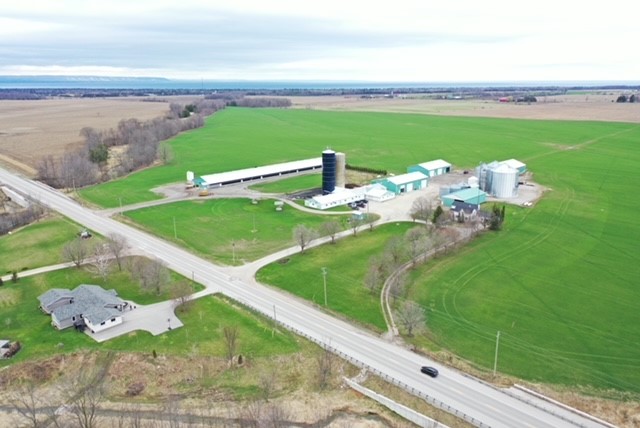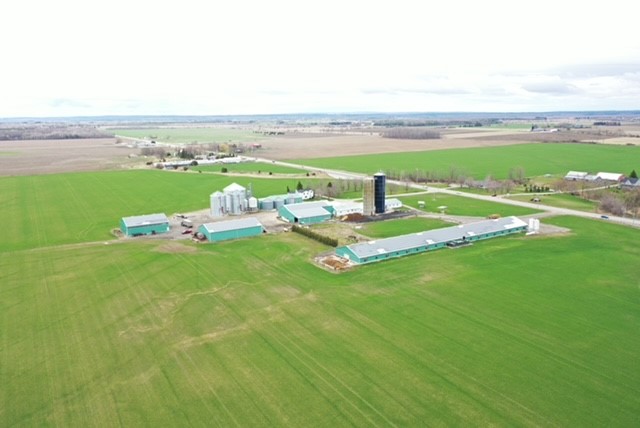SpringValley Farms (Elmvale Ltd.) was established by Ray Spring in 1947. Ray originally kept laying hens and added dairy in the mid 1950s. Ray’s son, John became involved with the business and in 1969 the hens were sold, and the focus transitioned solely to dairy under John’s influence. John, and his wife Janet are the parents of Dave Spring, who is now the third generation at SpringValley Farms.
Dave graduated from a two-year Ag Diploma program at the University of Guelph in 2002 and began working full-time on the farm with his father. With Dave’s input, they sold out of dairy in 2009, and got into the commercial chicken business instead. Dave said he felt there was a lot of potential for growth in that industry, and it fit well with their farm. They have 38,000 birds on a seven-week cycle and will complete a new barn in the next month, allowing them to expand that business more.
Dave’s mother, Janet, and wife, Holly are both teachers. Janet achieved her Master’s degree and now teaches university level courses part time. Although both work off farm, they still have an important role in supporting the work that happens around home. Dave and Holly have three children: Samantha (13), Karina (11) and Ryan (8) who are all starting to help out with work around the farm. He hopes that someday they will be interested in taking over as a fourth generation.
The farm also has one full-time employee, Justin Jarick, who can do any and all jobs required. Justin started visiting the farm with his father when he was young, worked for the Springs while he was in school, and transitioned to full time work from there. Dave commented that Justin is a very important of the day-to-day operations.
The cash crop operation has grown over the years to the point where they are currently working 1650 acres in a corn-wheat-soy rotation. Dave says he is a firm believer in good rotation, good soil health practices and tile drainage (which he believes will only be more important as input prices go up). He noted that farmers need to be very mindful of soil management practices, saying “If you don’t treat the soil right, it won’t treat you right!” Overall, their operation leans toward minimum tillage practices, but they work each field as is required for the soil type and conditions. His goal is always to have 30% residue cover in winter.
They use cover crops after wheat; usually planting oats, but on heavy farms he will also put in tillage radish. He thinks the best cover crop is the thinnest and the cheapest one!
Nearly every farm is grid sampled so that they can feed the soil what it needs – overfeeding costs too much. He noted that they always try to operate with best management practices in mind because if they don’t, it just costs money. Dave had a great comment that next year’s crop starts with the tail board of the combine, in good residue management. He emphasized the importance of thinking ahead and planning, saying “The day you’re in the field with the planter you have 100% yield potential.” From there just keep in mind what is best for the farm, manage for maximum efficiency and return, and hope that mother nature co-operates!
Dave feels that one of the best things he can do for their crops is to make sure that the farms are well tile drained. Good drainage allows them to plant when it is right to plant and harvest when the crop is ready to harvest, instead of waiting on fields to dry up enough to let them in.
Dave felt that practicing minimum tillage is the most important thing for soil health. They used a vertical till disc up until last year and now have a high-speed disc. He said they have a lot of technology on their planters and that he is aggressive about keeping that tech up to date. He also noted that equipment maintenance is important. They use electric drive row units and have hydraulic down force control which can change 50 times per second. They use this technology to maximize efficiency, saying that “You only have one chance to do it right, and if you need to try a second time it will cost you time, money and yield.”
Another strength of their operation has been the ability to store their own grain on-farm. They have always had storage on-site, and have grown their capacity as the acres they work have expanded. This allows them to have full care and control from harvest to market.
From GPS, yield monitoring, and grid sampling, they collect a large amount of data on the fields and crops. They use Climate Fieldview and the John Deere Operations Centre to help manage the data and put it to use. Dave noted that these are very good tools. As a result of this monitoring, they have trend patterns and variable rate maps for each field. They can look back on years of data accumulated, and variable-rate plant all their crops accordingly.
The Springs work with Brian Gilpin from BJS Farm Supply for seed and chemical and Alliance Agri Turf for fertilizer and variable rate scripting. Both have a hand in decision making. Dave mentioned that although there are many who support the farm with products and services, Brian has been especially important to their farm. He started working with Ray initially and has assisted all three generations – Dave thought it has likely been a partnership of 40 years!
In general thoughts on farming, Dave noted that every year is different, every farm is different, and you are never finished learning. Taking a blanket approach just does not work, and farmers need to constantly learn, evolve, and change. He said that they are always investing for tomorrow, thinking ahead, and learning from their mistakes. Making the mistake is not bad, it is what you do after that that matters.
Dave feels that two of the main challenges in agriculture right now are potential government restrictions, and a disconnect between farmers and the general public. With fewer people farming all the time, we need to work hard to educate those outside of the ag industry. He wondered if groups like OSCIA should have more of a part in that in the future.
As far as opportunities go, Dave says they are endless when you work in Ag. Agriculture has evolved immensely in the past decade, and will continue to over the next one. He talked about ideas like vertical farming, technology like 360 Rain, and drones that apply chemical and fertilizer as examples. 360 Rain in particular, could have the ability to completely change their cropping system. It is an innovative autonomous irrigation system with the ability to deliver 0.75” of water to a 100 acre field each week. Dave said that on sandy farms especially, that “could change a balance sheet pretty quick.”
At the farm level, Dave commented that there can be great opportunity in building a good marketing plan. He suggested farmers pick people they trust for advice and find good marketing leadership to follow.
On their own farm, Dave wants to continue improving yields on the land they have and hopes to do so using technology and good management. He also said that for multi-generational farmers, the dream is always the same. He hopes that his kids will stay involved with the farm, so that they can one day take over.
I would like to thank Dave, and the rest of the Spring family for sharing their operation with us. Dave’s passion for his work, gratitude for the support of family and friends, and positivity about the future were apparent throughout our interview. With his progressive use of technology on the farm it will be exciting to see what they accomplish in the coming years!



